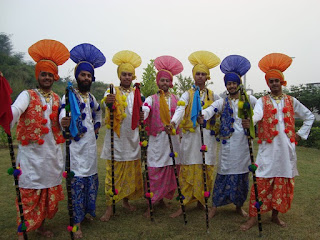INDIAN CULTURE
PUNJAB
INTRODUCTION
Punjab, a state bordering Pakistan, is the heart of India's Sikh community. The Punjab region takes its name from Persian words meaning 'five rivers'. The city of Amritsar, founded in the 1570's be Sikh Guru Ram Das, is the site of Harmandir sahib, the holiest Gurdwara. Known in English as the Golden temple,and surrounded by the Pool of Nectar, it's a major pilgrimage site. Also in Amritsar is Durgiana Temple, a Hindu shrine famed for its engraved silver doors
PUNJABI CUISINE
Punjabi cuisines tend to be the dominant throughout the country or you can say that Punjabi cuisines are mainstream food in Pakistan. Punjabi cuisines are consume in most of the ceremonies e.g. at weddings, birthday parties, family reunions, etc. Its's common to find a biriyani or a kuruma present in the menu as a main course dish in almost every food selling point in Pakistan. No matter where these dishes originated from, within the boundaries of Pakistan, they are essentially considered to be Punjabi.
PUNJABI MUSIC
Bhangra is one of the many Punjabi musical art forms that is increasingly listened to in the west and is becoming a mainstream favorite. Punjabi music is used by western musicians in many ways, such as mixing it with other compositions to produce award winning music. Devotional songs are played by dhaddi jatha groups, with instruments like sarangi and dhadd drums.
PUNJABI DANCES
The dances are typically perforemed at times of celebration, such as harvest, weddings, festivals like Lohri and spring festival, etc., at which everyone is encouraged to dance. Married Punjabi couples usually dance together. The husband dances in the style of male Punjabi danves, frequently with arms raised, and the wife dances in the style of female Punjabi dances.
PUNJABI MUSIC
Bhangra is one of the many Punjabi musical art forms that is increasingly listened to in the west and is becoming a mainstream favorite. Punjabi music is used by western musicians in many ways, such as mixing it with other compositions to produce award winning music. Devotional songs are played by dhaddi jatha groups, with instruments like sarangi and dhadd drums.
PUNJABI DANCES
The dances are typically perforemed at times of celebration, such as harvest, weddings, festivals like Lohri and spring festival, etc., at which everyone is encouraged to dance. Married Punjabi couples usually dance together. The husband dances in the style of male Punjabi danves, frequently with arms raised, and the wife dances in the style of female Punjabi dances.
COMMON PUNJABI FOLK DANCES
- Sammi
- Giddha
- Kikli
- Bhangra
- Jhumar
- Mirza
PUNJABI DRESS
The traditional dress for Punjabi men is the kurta and tehmat, which is being replaced by the kurta and paijama, especially the popular muktsari style in India. The traditional dress for women is the salwar suit which replaced the traditional Punjabi ghagra. The patiala salwar is also very popular.
PUNJABI FESTIVALS
Punjabi celebrate cultural,seasonal and religious festivals, which include Maghi, Mela Chiraghan in Lahore, Lohri, Holi, Baisakhi, Teeyan, Diwali, Dussehra, and Guru Nanak Jayant.
PUNJABI WEDDING
Punjabi wedding traditions and ceremonies are traditionally conducted in Punjabi and are a strong reflection of Punjabi culture. While the actual religious marriage ceremony among Muslims, Hindus, Sikhs, Jains, Buddhists and Christians may be conducted in Arabic, Urdu, Punjabi, Sanskrit, Hindi or Pali by the Qazi, Pundit, Granthi or priest, there are commonalitites in ritual, song, dance, food, and dress. The Punjabi wedding has many rituals and ceremonies that have evolved since traditional times.
CONCLUSION
Culture has great importance. Culture is the identity of the nation, without culture the society is impossible.Culture is the basic root of any community which gives them the way of life. The culture provides solution to the critical problems that is faced to community. Culture teach us to think for the whole nation not individually, it provide the concept of family, nation, etc.
By
Pooja Ashok









clear and complete information about punjab.
ReplyDeleteThis blog is complete and perfect.
ReplyDeleteawesome songs and lassi my favorite
ReplyDeleteyeah this article says the complete information about punjab. punjab is rich in the production of wheat.
ReplyDelete